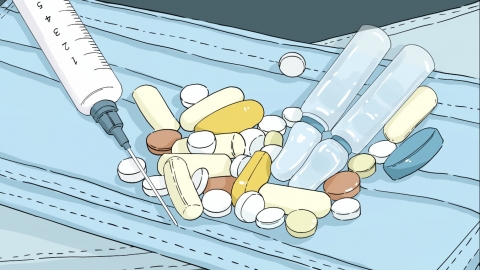What are the efficacy, uses, and side effects of Montmorillonite Powder?
Generally, Smectite Powder has functions and effects such as antidiarrheal action, adsorption, pain relief, intestinal mucosa repair, and balancing intestinal flora. It may also cause side effects including allergic reactions, constipation, impaired nutrient absorption, reduced absorption of other medications, and intestinal obstruction. A detailed analysis is as follows:

I. Functions and Effects of Smectite Powder
1. Antidiarrheal Effect
As an astringent, smectite powder can absorb water in the intestines and form solid feces, thereby achieving the purpose of controlling diarrhea. This effect helps alleviate diarrhea symptoms, especially in cases of watery diarrhea.
2. Adsorption Effect
Smectite powder has strong adsorptive capacity and can adsorb harmful substances such as pathogens, viruses, and bacterial toxins in the intestine, fixing them on the surface of smectite particles, which are then excreted from the body with feces, thus reducing irritation and damage to the intestinal mucosa by these harmful substances.
3. Pain Relief
Smectite powder has local analgesic effects and can relieve pain symptoms caused by intestinal diseases, especially effectively alleviating abdominal pain caused by diarrhea.
4. Repair of Intestinal Mucosa
Smectite powder forms a protective layer inside the intestine, covering the damaged intestinal mucosa, promoting the regeneration and repair of intestinal mucosal cells, and helping restore intestinal barrier function.
5. Balancing Intestinal Flora
Smectite powder has a special laminar structure and non-uniform charge distribution, which enables it to adsorb and immobilize viruses, pathogens, and their toxins in the digestive tract, rendering them non-pathogenic, which helps restore the balance of intestinal flora.
II. Side Effects of Smectite Powder
1. Allergic Reactions
Some individuals may be allergic to components in smectite powder, experiencing allergic symptoms such as rashes and itching. Rashes may present in various forms including erythema and papules, and the degree of itching may vary among individuals, potentially affecting the patient's quality of life in severe cases.
2. Constipation
Smectite powder can cover the digestive tract mucosa and enhance the defensive capacity of the intestinal mucosal barrier by binding with mucin glycoproteins, promoting the repair and regeneration of intestinal mucosa. However, if the dosage is too high or the duration of use too long, it may excessively adsorb water and fecal matter in the intestines, causing dry and hard stools, leading to constipation, difficulty in defecation, and reduced frequency of bowel movements.
3. Impaired Nutrient Absorption
Smectite powder adsorbs various nutrients in the intestines, such as fats, vitamins, and amino acids. Long-term or excessive use may interfere with the absorption of these nutrients, leading to nutritional deficiencies. For example, fat absorption may be affected, resulting in increased undigested fat particles in the stool and reduced energy absorption by the body.
4. Reduced Absorption of Other Medications
Smectite powder has strong adsorption properties and may not only adsorb pathogens and toxins in the intestines but also adsorb other medications taken concurrently, reducing their bioavailability and affecting their therapeutic efficacy.
5. Intestinal Obstruction
In rare cases, smectite powder may form masses in the intestines, particularly in patients with underlying conditions such as intestinal stenosis, which may lead to intestinal obstruction, presenting typical symptoms such as abdominal pain, bloating, vomiting, and cessation of flatus and defecation.
In daily life, it is important to maintain a bland diet and avoid excessive consumption of spicy or cold foods, such as snail rice noodles and ice cream, to prevent increased gastrointestinal burden and reduce the occurrence of diarrhea and other symptoms.








